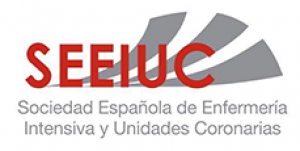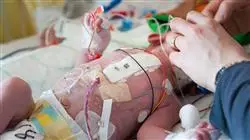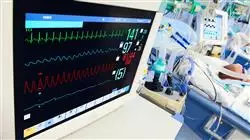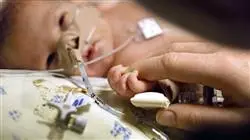University certificate
Scientific endorser

The world's largest faculty of nursing”
Description
Quality critical care is care that responds to the latest scientific evidence, so staying current is key to providing the best care for newborns"

Neonatology is a discipline in constant evolution, which is highly dependent on technology and new pharmacological treatments, but this context makes the updating of the procedures performed by professionals in neonatal critical care of utmost importance to maintain the provision of care based on the latest scientific evidence and to ensure the safety of the baby. The most frequent pathologies to be treated in the NICU, besides being the most relevant due to the vital commitment they have on the newborn, are cardiac and respiratory pathologies.
This program includes the most relevant aspects about the admission of the newborn in the neonatology unit or NICU, the knowledge and management of respiratory and cardiac pathology, as well as the medical-legal aspects in neonatology.
The Postgraduate diploma in Neonatal Cardiac and Respiratory Pathology Care for Nursing allows, in a practical way, to achieve this update of the most used procedures to contribute with quality and confidence to the recovery of neonates, improve their prognosis and avoid the sequelae of severe pathology.
Improve the care of your newborn patients with the program offered in this Postgraduate diploma in Neonatal Cardiac and Respiratory Pathology Care for Nursing"
This Postgraduate diploma in Neonatal Cardiac and Respiratory Pathology Care for Nursing contains the most complete and up-to-date scientific program on the market. The most important features include:
- Clinical cases presented by experts in the different specialties. The graphic, schematic, and practical contents with which they are created provide scientific and practical information on the disciplines that are essential for professional practice
- New developments in nursing care for the main cardiac and respiratory pathologies in the newborn patient
- Presentation of practical workshops on procedures, nursing care and diagnosis and treatment techniques
- An algorithm-based interactive learning system for decision-making in the clinical situations presented throughout the course
- Practical guidelines on cardiac and respiratory pathologies. These guides follow the scientific and pedagogical criteria of the main scientific reference
- All of this will be complemented by theoretical lessons, questions to the expert, debate forums on controversial topics, and individual reflection assignments
- Content that is accessible from any fixed or portable device with an Internet connection
This Postgraduate diploma may be the best investment you can make when selecting a refresher program, for two reasons: in addition to updating your knowledge in Neonatal Cardiac and Respiratory Pathology Care for Nursing you will obtain a qualification endorsed by TECH Global University"
Its teaching staff includes renowned specialists in the field of neonatology, who bring the program their work experience in the country’s leading medical centres.
Thanks to its multimedia content developed with the latest educational technology, they will allow the professional a situated and contextual learning, that is to say, a simulated environment that will provide an immersive learning programmed to prepare for in real situations.
This program is designed around Problem-Based Learning, whereby the nursing professional must try to solve various typical professional practice situations that arise during the program. In order to do this, the nursing professional will be assisted by an innovative interactive video system, created by renowned and experienced experts in treating critical neonatal patients and with extensive teaching experience.
Increase your professional possibilities by studying the Postgraduate diploma in Neonatal Cardiac and Respiratory Pathology Care for Nursing"

It includes clinical cases in a real simulation environment to bring the development of the program as close as possible to everyday practice"
Objectives
This program is oriented towards effectively updating nurses’ knowledge of the procedures for dealing with a newborn, in order to provide quality care based on the latest scientific evidence that guarantees patient safety.

This refresher program will generate a sense of confidence when providing neonatal care, which will help you grow both personally and professionally”
General objectives
- Provide nursing care oriented to satisfying the needs of newborns with health problems as well as preventing complications, all while guaranteeing safe and quality practice
- Provide comprehensive newborn care from an ethical and legal perspective
- Decide effectively and efficiently the different procedures, diagnostic tests and treatments derived from the different health problems in the newborn taking into account the different levels of care
- Assess the needs of the newborn and provide comprehensive care during the surgical process, in order to optimize their recovery and to identify, intervene and/or refer them as a result of possible complications
- Update the indication of medical devices and/or drugs, evaluating the expected benefits and associated risks
- Develop the ability to apply theoretical knowledge in daily practice
Specific objectives
Module 1. Important Aspects of Neonatology
- Categorise neonatal stages, as well as neonatal stages by gestational age and neonatal stages by weight at birth
- Determine the differences which exist in the pediatric age group between a newborn, a child and an adolescent
- Revise the anatomical and physiological characteristics of a normal newborn
- Establish the techniques for measuring the somatometry of a newborn, as well as its morphological and physiological characteristics
- Assess the complete examination, sequence of physical examination and complete physical examination of the newborn, focusing primarily on the head and neck region, trunk region and extremities region
- Describe the process of a complete neurological examination on a newborn
- Evaluate the structure and organization of a Neonatology Service, as well as its location, the necessary equipment and materials; and the necessary human resources
- Acquire up-to-date knowledge of the arrival of a newborn in the neonatal ward, the admission criteria, its objectives and the necessary nursing interventions
- Incorporate new techniques in the physical examination of a newborn on its arrival in the neonatal ward
Module 2. Admission of a Newborn in the Neonatal Ward or in the NICU
- Determine how to structure a neonatal intensive care unit (NICU), as well as the calculation and arrangement of the cribs, the necessary physical space needed, the necessary equipment and materials; and the necessary human resources
- Identify the profiles and roles of the "nursing team" as well as its operating system: Primary Nursing
- Describe the guidelines for drug administration in neonatology
- Establish the criteria and objectives for admission of a newborn to the NICU; as well as the necessary nursing interventions
- Identify and classify the types of neonatal transport, its objectives and its purpose
- Select the necessary team and equipment to provide appropriate neonatal transport
- Acquire up-to-date knowledge of the therapeutic measures for treating pain in newborns, as well as how to manage the pain in some of the procedures in the NICU
Module 3. Respiratory Pathophysiology and Respiratory Disorders in Neonatology
- Identify the modalities of respiratory assistance
- Revise the process of lung development, lung embryology and lung anatomy
- Review the respiratory physiology of a newborn
- Assess the respiratory problems of a newborn
- Establish the involvement of nursing staff in treating a newborn with a respiratory disorder
- Describe the mechanical ventilation and non-invasive ventilation techniques, as well as the nursing care involved in mechanical ventilation and the ventilation modes
- Incorporate endotracheal intubation and extubation techniques
- Acquire up-to-date knowledge of the cricothyroidotomy or coniotomy procedures
- Describe the procedure to perform a tracheotomy
Module 4. Cardiac Disorders and Congenital Heart Disease in Neonatology
- Gain up-to-date knowledge of the cardiac massage technique
- Identify the differences in the response to a neonatal cardiopulmonary arrest and one in an older pedriatic patient
- Revise the general aspects of the cardiovascular system, embryology and cardiac anatomy
- Distinguish between the different types of congenital cardiopathies
- Evaluate the involvement of the nursing professional in treating a newborn with congenital cardiopathy
- Learn how to create a nursing care plan
- Gain an understanding of preoperative and postoperative care in cardiac surgery
- Gain up-to-date knowledge of the nursing procedure for addressing bacterial endocarditis

Take the opportunity to learn about the latest advances in this field in order to apply it to your daily practice"
Postgraduate Diploma in Neonatal Cardiac and Respiratory Pathology Care for Nursing
.
Neonates with cardiac or respiratory problems require excellent care to ensure their well-being and survival. In this context, nurses are essential for the comprehensive management of these pathologies and the implementation of appropriate procedures for their state-of-the-art care. To this end, they are obliged to be familiar with the latest scientific advances in this area. Faced with this situation and with the need to respond to this need for nursing updating, TECH has created the Postgraduate Diploma in Cardiac and Respiratory Pathology Care of the Neonate for Nursing. In addition, you will obtain this learning enjoying a 100% online methodology and without neglecting your personal and professional obligations.
Get up to speed in this area in just 6 months
.
Do you intend to learn about the recent advances in the care required for cardiac disorders and congenital heart disease in neonatology, respiratory conditions or the cutting-edge legal issues involved in this area? With the Postgraduate Diploma in Neonatal Cardiac and Respiratory Pathology Care for Nursing, it's entirely possible! Get this update from the hand of a prestigious teaching staff, composed of a wide number of specialists who have extensive professional experience behind them.







